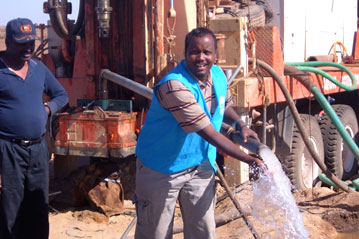UNHCR optimistic about meeting water needs of refugees in Ethiopia
UNHCR has always faced difficulties ensuring that refugees in eastern Ethiopia have enough water, but is optimistic that new projects will solve the problem.
ADDIS ABABA, Ethiopia, April 2 (UNHCR) - Over the past two decades, UNHCR has helped more than 600,000 Somali refugees in the eastern lowlands of Ethiopia. Providing them with enough water has always been a problem, with the UN refugee agency facing funding shortfalls, meagre and difficult to access underground reserves, and competition from locals for the scarce resource.
That's as true today as it was in 1991, when Somalia started disintegrating after the fall of the Siad Barre regime and people began fleeing. Most of the refugees eventually returned home, with just 16,000 remaining in Kebribeyah camp. But renewed conflict in Somalia has led to fresh influxes, prompting UNHCR to open the Aw Barre and Shedder camps in 2007 and 2008 respectively.
Under UNHCR's emergency guidelines, a person needs at least seven litres a day to survive and 20 litres a day to ensure their well-being and good health. Currently, that minimum standard of 20 litres is not being met in any of the three camps, but UNHCR believes that projects now under way should ensure that this target is reached and that access to water outlets is improved.
To meet the needs of Kebribeyah, the former Hartisheik camp and local communities, UNHCR in 2004 opened a pipeline to transport water from the well watered Jarar Valley, some 20 kilometres away.
But, as UNHCR Representative in Ethiopia Moses Okello noted, "Even this huge project does not guarantee an adequate supply of water to every family in the camp. Technical problems, and the high cost of managing the system, mean occasional failure to meet the minimum daily standard of water."
To resolve this problem, the UN refugee agency and the Ethiopian Electric Power Corporation have been working to connect the Jara Valley water supply system to the national electricity grid, which will make it cheaper to power the system than using fuel-guzzling generators. Okello believes this will solve many of the problems related to running the facility.
Meanwhile, to meet daily needs in the Aw Barre and Shedder camps, UNHCR had to truck large quantities of water from a nearby town, drill boreholes and construct a distribution network to ensure that refugees did not have to go far to get access to water.
Okello said that thanks to special funds made available for water and sanitation projects by UN High Commissioner for Refugees António Guterres, "We have been drilling and interconnecting half a dozen boreholes in the two camps. So far we have managed to provide a daily average of 12 litres per person in the two camps."
It is a work in progress. But Okello said he was optimistic that the minimum standard per person of 20 litres a day would be achieved in all three camps once the various water projects had been completed.
Somali refugee Rahma Mohammed Jamale, who fled to Ethiopia to escape conflict in Mogadishu, was one of the first residents of Shedder camp when it opened in May last year. She said it was initially tough finding enough water for herself and her six children.
"We had only two water points for a whole zone and that meant queuing up for hours to get a jerry can of water," she said, adding that the situation was much better but more work was still needed to increase the water supply for the camp's 6,600 refugees and Ethiopians living nearby.
Jamale said the improved water situation meant that children in the camp were spending more time in school and less time lining up for water. "But for this positive development to be sustained, it is up to us refugees to guard the system against misuse," she added.
By Kisut Gebre Egziabher in Addis Ababa, Ethiopia
Related news and stories
Thousands of newly arrived Somali refugees in Ethiopia relocated to new settlement
Samira's Story
Drought brings life-threatening food shortages for refugees in Ethiopia
100,000 new Somali refugees arrive in Ethiopia in the past month, UN and partners are calling for urgent funding
UNHCR teams and partners rush assistance to some 100,000 newly arrived Somali refugees in hard-to-reach area of Ethiopia
As the Horn of Africa drought enters a sixth failed rainy season, UNHCR calls for urgent assistance
-

Regional Roundtable on the Role of Faith-Based Organizations in Addressing Displacement in MENA
7 Dec 2021 The purpose of the meeting was to explore the role of religion in promoting universal understanding and respect of human dignity, and faith-based responsibility towards displaced people and refugees. The main goal of the roundtable was to formulate commitments or pledges from religious actors in the region to refugees at a time of heightened tensions in some places towards the GRF. -
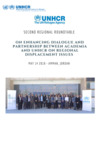
Second Regional Roundtable On Enhancing Dialogue and Partnership Between Academia and UNHCR on Regional Displacement Issues
7 Dec 2021 The second regional academia roundtable, co-hosted by UNHCR, the WANA Institute and the Columbia Global Center | Amman saw the participation of over 40 participants from various think tanks, academic institutions and research centers from across the MENA region. This gathering provided a platform for academia to frame its role in influencing policy, programs and discourse related to displacement in the MENA region in the context of major global processes including the Global Compact on Refugees (GCR) and the Comprehensive Refugee Response Framework (CRRF). -
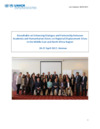
Roundtable on Enhancing Dialogue and Partnership between Academia and Humanitarian Actors on Regional Displacement Crises in the Middle East and North Africa Region
7 Dec 2021 Organized by the UNHCR MENA Policy Unit, in partnership with the West Asia-North Africa (WANA) Institute, the first of its kind regional roundtable for academia brought together academics, think tanks, research centers, and university professors from 12 countries to discuss their role in humanitarian interventions. The discussions brought to light challenges that academia faces, and generated concrete suggestions and good practices in relation to solutions. -

The First MENA Roundtable on the Role of Art and Culture in Addressing Displacement
7 Dec 2021 The roundtable was the first of its kind in the region and aimed to discuss how artists and cultural actors can shape public narratives and expand the space for constructive dialogues, particularly in relation to social cohesion between refugees and host communities. The roundtable provided a platform for over 50 artists and cultural actors to frame their role in issues related to displacement in MENA and share successful practices of promoting refugee inclusion. -
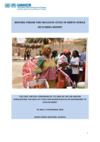
Mayors Forum for Inclusive Cities in North Africa Outcomes Report
7 Dec 2021 The Mayor's Forum for Inclusive Cities in North Africa brought together mayors, municipality authorities and civil society organisation representatives from major refugee hosting cities in Egypt, Morocco, Algeria, Libya, Tunisia and Mauritania. The forum was hosted by UNHCR under the supervision of the Mayor of Tunis and aimed to build a common platform of good practices and learning among cities and with UNHCR, on the challenges and opportunities facing sustainable policy design and operational for inclusive cities. -
Briefing to the United Nations Security Council
7 Dec 2021 -

Evaluation of UNHCR's engagement in humanitarian-development cooperation Sep 2021
7 Dec 2021 This report contains the findings of an evaluation of UNHCR's engagement in humanitarian-development cooperation (Sep 2018 - March 2021). The evaluation was commissioned by UNHCR due to recent high-level policy developments and initiatives, such as the 2016 Global Compact on Refugees, in order to support a more comprehensive response to displacement, involving both humanitarian and development actors. Attachments: Executive Summary, Management Response and Annexes (.zip) -

Age Gender and Diversity Tip sheet - Helping to ensure AGD inclusive pledges and good practices for the GRF (ENG, 2021)
6 Dec 2021 This Tip Sheet builds on the progress made at the 2019 Global Refugee Forum (GRF) to help ensure pledges address gaps related to age, gender, and diversity (AGD), including disability, in refugee responses. -
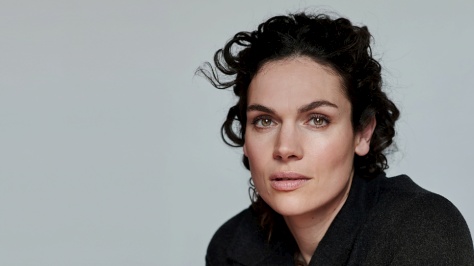
Anna Drijver
Anna Drijver has been supporting UNHCR since 2018.

